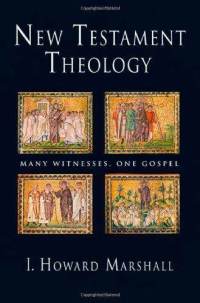 I. Howard Marshall's chapter of Mark in terms of Dogmas, Doctrines, Distinctives, and Details.* Dogmas. Although Marshall values Higher Criticism, he denounces the idea that the gospels are a random spattering of stories collected from Jesus' life and ministry strung together as each gospel writer attempted in vain to recall the exact ordering of events. Instead, he points out why each gospel is different (ex. available space to record, limited access to all information, and authorial situational context). So while Marshall may not hold to inerrancy, he still values scripture's authority by accounting for differences as each author promoting a theological message and desired response. Marshall then affirms that Mark's desired response is the Twelves' recognition of Jesus as the Christ (Mark 8:27-9:13) as the “center point” of the gospel both literally and theologically (67-68). His understanding of Mark's Christology breaks loosely into the “function” and “ontology” of Christ. Here Marshall is surprising in his assessment that Christ's message, Mark 1:15, is not a primary theme throughout the gospel (60). Instead, Marshall focuses more on “who is Christ?,” seeing the messenger as more important than the message (81). The importance of Christ's ontology shines through with focus on the “Son of Man” (85), Jesus as a suffering Messiah, bearing the cross as discipleship (86). Mostly importantly, Marshall captures that the two laws of Christ, the shema in Mark 12:28-34, are central to Mark's theology, and subsequently to the understanding of the mission of God through the Gospel (73). Thus, he affirms that the sphere of God's salvation is only found in “the kingdom [which] consists of those who respond to the message in repentance and faith” (80). Doctrines. Marshall sees a three-strand story in Mark (63) that reveals Christ's strategy to train a small group well to reach all people vs. reaching a wide audience poorly. One might say from Marshall's words that Jesus is more interested in quality of believers than quantity of believers, since he states that the proper response to the gospel seems to be the goal of Mark's writing. Marshall also delineates the meaning of “follow” as meant by Jesus (88). Jesus' use didn't necessarily mean simply having faith in Christ and his message, but indicated a personal attachment demanding total commitment, revealing Marshall's stance on nominalism, “Cultural Christians,” or inactive believers. Distinctives. While most Reformed scholars would agree with Marshall's fairly unspecific statements on the reprobate, his tone betrays his Libertarianism as he ensures the locus of responsibility falls not on God as the agent responsible for unbelief, but on individuals persistently refusing to believe (90). Marshall affirms the kingdom as central to Jesus' teaching and the dual conceptions portrayed. Here he promotes a contrast between a “transcendent spatial kingdom” and an “immanent dynamic kingdom” as opposed to “apocalyptic expectations” and the “present experience” of this world (78-79). Details. Marshall comments that the accounts of Jesus fall into one of two categories, “what Jesus did in the presence of anybody and everybody, and what he did when only the Twelve were with him” (67). He seems to use this to indemnify Jesus for seemingly caring little for the vast population (Marshall cares deeply about people of needs), but that he was strategically narrowing his audience to a small group privy to his true mission so they could care for their physical, social, and spiritual needs. Interestingly, Marshall spends so much time on orthodox issues that common topics of scholarly debate, such as author speculation, are absent. Instead, Marshall simply assumes Markan authorship. Marshall, I. Howard. New Testament Theology: Many Witnesses, One Gospel. Downers Grove, Ill: InterVarsity Press, 2004. *Dogmas are theories directly impacting God's mission to reconcile all people to Himself (orthodoxy & orthopraxy required).
Doctrines indirectly impact God's mission (and are thus vitally important), but people can fail to interact with or understand them accurately (essential to orthodoxy, not orthopraxy). Distinctives don't affect the orthopraxy of salvation, but will impact the orthopraxy of a church. Details have little to no effect on orthodoxy or orthopraxy.
0 Comments
Leave a Reply. |
AuthorBrett Yardley: Categories
All
Archives
January 2019
|

